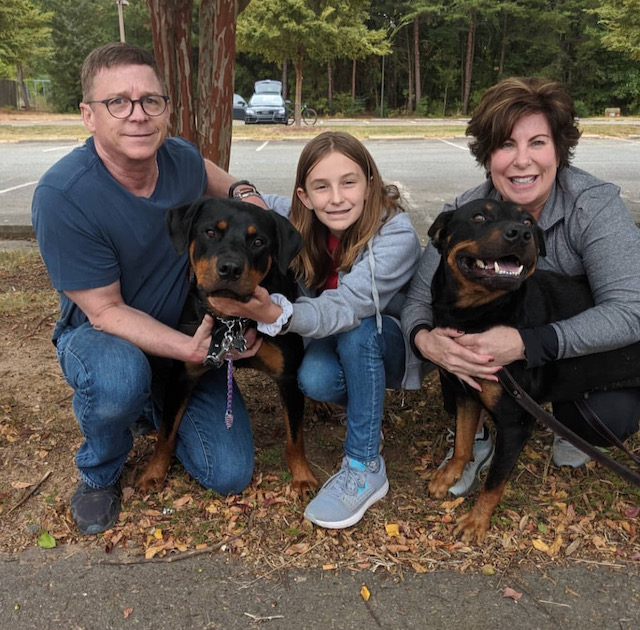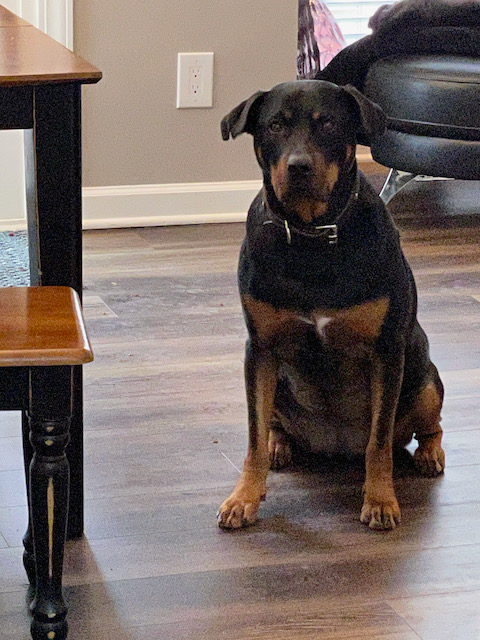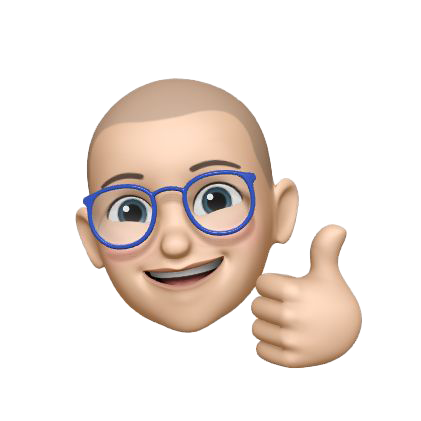Dealing With Me
Look, we’re all different, and that’s a Good Thing™! We all think, act, and most importantly, communicate, differently. To that end I thought I’d write up this short guide to working with and communicating with me.
A Guide to Working with David G. Simmons
- Pronouns: He/Him
- Title: Principal Developer Advocate
- Location: Apex, NC
- Working Hours & Timezone: Roughly 8:00 am - 8:00 pm US Eastern Time. I don’t work all of those hours, but that’s pretty much when I can be considered
available. - Name Preference: Please, don’t call me Dave. I prefer David
Who Am I?

Non-work
Work accounts for a good portion of my time, of course, but it’s not all of who I am.
In the Before Times™ I was a complete nut about going to the gym. I went 5 days a week and was in pretty good shape (I could do 1,000 situps!). Hopefully once we are through this whole thing I can go back.
Hobbies
Well, I have a lot! I have 2 dogs, Bruno and Rosie. They are rescue Rottweilers. Not at all related, but the best of friends!


Dog rescue
I’ve worked in dog rescue for over 20 years and am passionate about dogs. Almost irrationally so sometimes! 🤣
Woodworking
I’m also a woodworker (or at least I used to be, when I have a workshop) and make furniture and stuff on the lathe. You can see more about that on my website.
Family
I’ve got a wife and 3 kids, the oldest of whom is 24 and the youngest is 14. The middle child is a disabled child which brings up another hot-button issue of mine: Disability Rights.
Work
I’m a Principal Developer Advocate (DR4) at Camunda which is a Business Process Automation company based in Berlin, Germany. I work remotely from my home on North Carolina USA.
I’ve been working remotely for 15+ years now so if you’re looking for timp on how to be effective as a remote worker, I’m happy to talk to you about it!
My day-to-day tasks are mostly typical DevRel tasks:
- Write blog posts
- Repond to community users’ questions
- Speak at events (someday, when travel is a thing again)
I’m currently doing a lot of work on tooling. I’m developing some tools to be used internally at Camunda, and in the wider DevRel Community, to automate some of the common DevRel tasks, and to better gather data about our communities and their health. This is an ongoing effort.
Speaking of the “wider DevRel Community,” I am also one of the moderators (AKA Benevolent Dictators) for the DevRel Collective. The Devrel Collective is a group of almost 2,000 DevRel professionals on Slack where we talk about … well, just about everything!
My career
I did not take a ’traditional’ path into tech. I even wrote a whole thing on it a while back! But I’ve been in tech now longer than I was ever in anything else, so I guess I’m here to stay at this point.
One of the things about a bunch of my career is that I just happened to be in on some things at the start. Thin Client computing, IoT for example. I’ve been doing IoT now for more than 15 years (getting closer to 20, actually) and that’s something not many people can say.
I’m hoping to somehow bring IoT and Camunda together in some way.
What Does Success Mean to Me?
My Primary goal here is to help people. I call it Being of Service. It’s sort of what my entire life is based on: Being of maximum service to others. So being successful means I’ve helped someone. Or I’ve helped lots of people. I’ve made a positive impact on someone’s life.
In terms of tech, that means I’ve made it easier for someone to do their job. I’ve given them a less-difficult way to solve a problem. I’ve made their life as a developer easier. It really is that simple.
I have pretty high standards, for myself anyway. I always want to do the absolute best job possible. I tend to judge myself way too harshly against that standard, of course.
Working Style
Tooling Preferences
So this is a weird thing. Because it’s not just my personal preferences with tools, it also involves your preferences. I mean, if I hate email, but that’s the best tool for you, then I should use email when interacting with you, right?
But here’s my ordered list of preferences:
- Slack: either DM or @ mention in a channel. Especially if it’s important/urgent. I’m much more likely to see it and respond to it
- Video Call: Let’s talk face-to-face. This is especially good if there’s even the slightest possibility that there’s a problem between us, or we’ve somehow gotten sideways with each other.
- Email: Back in the day, I used to do prety much everything over email, but that was before we had other tools. Now? I tend to forget to check my email for hours at a time. Sometimes all day. I’m much more likely to see a Slack message, or even a DM/mention on twitter, than I am to see an email. Caveat Emptor: if it’s a detailed thing that needs a detailed response, an email thread can be the best way. In that case, please do send me an email, but just make sure I know you sent it by pinging me on Slack, etc. so I don’t miss it!
- Direct phone call: Gotta be honest, not a fan of talking on the phone. Text message, sure, but just chatting on a phone? When there are video options available? Still not a fan. Last resort? Sure, but don’t be surprised if I am hurrying to end the conversation. It has nothing to do with you and everything to do with my dislike of phonecalls.
Collaborative Work
I’ve been working remotely for so long that I’m very used to working all by myself. I’ve also worked on some very small projects, or for very small companies, so one-person-band has been a way of life. That being said, I do love helping others with projects, problems, or whatever may pop up.
I am terrible at asking for help, mostly. I’d rather bang my head against a problem until I figure it out even when just asking “How do you do this?” would be faster. Probably due to a large-helping of impostor syndrome, but still.
If we’re collaborating on a project, asynchronous communication is usually best for me. We can kick it off with a zoom call, and have some catch-up meetings if needed, but async usually works best for me.
Deadlines make me panic, sometimes. Usually if I’m getting near to them and I’m not ready. Deadlines and timelines are something we should communicate on regularly if we’re working together.
Back-to-back meetings make me want to jab my eyes out. :-) Let’s space things out to give me some recovery time!
Feedback Preferences
In general, I love getting feedback. I like to hear how my work is impacting others, what’s working, and what isn’t working.
I especially want to hear from you if something I’m doing – or how I’m acting in any way – is negatively impacting you. I have been on a life-long journey of self-improvement and many of my biggest leaps forward have been thanks to someone who had the courage to come to me and say “you know, when you do X, it really makes me feel Y.” That’s how I know things about myself that I need to change.
Here’s a quick guide to giving me feedback:
Positive feedback: Almost anything works here! I’m no different than anyone else in that I like to hear good things about myself, and the work I’m doing, and especially how it impacted you or helped you.
Negative feedback: Not everyone is good at taking negative feedback. I try to be, but it’s easier if it’s framed around a couple of things:
- A specific thing that I did/said that had a negative impact on you
- A specific example of a communication style, etc. that didn’t work for you and why. “When you said this to me, I really didn’t like it because …”
- Non-accusatory. Really, I’m not doing the things I do, or saying the things I say to hurt or offend anyone (well, unless it’s on twitter in which case … maybe, but really only if you’re a politician). So accusing me of intentionally hurting you will likely just get my back up/make me defensive. Just tell me the impact it’s had on you and I’ll hear it more easily.
And here’s how I can give you feedback
Positive feedback: I’m happy to give you positive feedback, in person or in public, as often as I can. I truly believe that people need to hear about what they are doing well and how it affects those around them. If I’ve given you positive feedback in person, and you’d like others to hear it too, just tell me and I’m more than happy to sing your praises publicly. I often do it privately first because some people are uncomfortable with the whole public-praise thing.
Negative feedback: I try to never give negative feedback publicly. If you have a prefered style of receiveing negative feedback, let me know what it is and I will do my best to do it in a way that makes you comfortable receiving it. I never want to put a person down, or make them feel less than. I really only want to help you improve.
Strengths & Weaknesses: If you want to know what I see as your strengths, just ask! I love to tell people positive things about themselves! If you’re looking for ways to improve, ask about that! I don’t see those as ‘weaknesses’ as much as ‘growth opportunities’.
You can lean on me to…
Here is a short list of things I’m pretty good at and would more than happy to help you with or answer questions about:
- Go the programming language. Turns out I do the vast amount of my development in Go these days, so I’m pretty good at it
- IoT I’ve been doing this since before it was called IoT, so I have a lot of experience here
- Microcontrollers If you’re doing something with Arduino, or pretty much any microcontroller or sensor, chances are i a) have one or more lying around b) have programmed it and c) am happy to share code, examples, or pair with you to get it working
- Submitting CFPs is something I have gotten really good at, and I have sort of a ridiculously high acceptance rate. Maybe it’s from years of organizing conferences, or whatever, but I can likely help you write a concise, punchy CFP-response
- Speaking I’m no speaking coach, but I’ve been coached a lot, so I might be able to help you there too
- DevRel-stuff I’ve been doing DevRel longer than I’ve been doing IoT. I don’t have all the tools and mechanics that Mary does, but I’m happy to chat with you about style, approach, etc.
If you have a project that needs to me build something, like some sensor hardware, or 3-D print something, I’m all in!
I’m tech-support for my entire family, most of my friends, and a lot of other people. If you’re having trouble with Linux or Mac, networking issues, iPhones, etc. I can likely help you solve it. If it’s Windows, you’re on your own. I only do Windows support for real $$.
You can support me by…
I really need to start using Java again as a programming language, so any encouragement or pointers to small tasks I can do in Java would be helpful.
I’m terrible about remembering Action Items from meetings, so if we have a meeting, and there’s something you need from me as a result of it, a quick Slack message or email with what you expect from me is super helpful.
I am very likely to say yes to every project automatically even when I should say no or maybe. Especially if it involves writing some code to automate something. I sometimes will just go do a thing when not asked, so if it’s really not an especially important thing, maybe mention to me that I shouldn’t just go do it!
Personal Notes: I deal with a coupole of issues on an on-going basis which may (or may not) be impacting me at any given time:
- I suffer from chronic pain. Most days this isn’t an issue for me as I’ve been dealing with it for so long but there are some days when it overwhelms me. I can get grumpy, short-tempered, etc. on those days. On a very few days I am completely debilitated by it and will be out.
- I deal with tinnitus all the time. During zoom meetings, etc. this is generally not an issue. But if we ever go back to in-person events please understand that in group situations, especially those that have a high level of background noise – I likely have great difficulty hearing and understanding what is being said. If ears were treated like any other medical condition I’d ideallly have hearing aids to help me deal with it but they aren’t, so I don’t.
- I have ADD. It is well treated, but just know that if you see me having trouble listening or focusing during a meeting or elsewhere, it’s likely due to that. Or the above-mentioned tinnitus.
